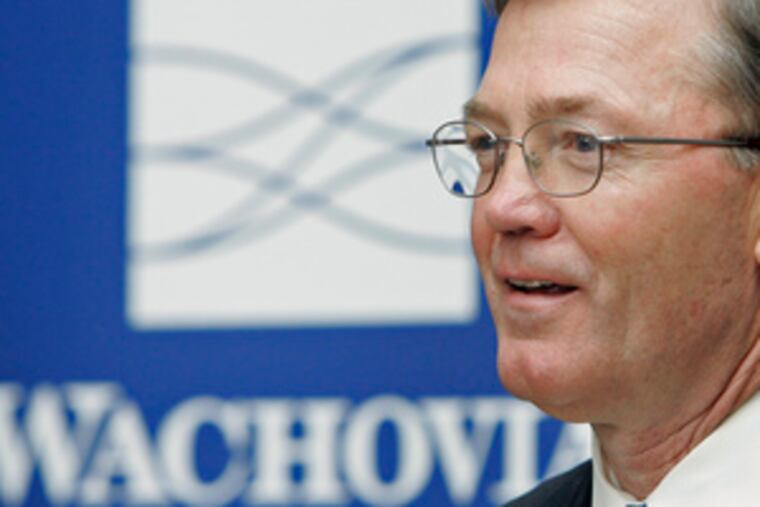Wachovia board fires CEO
Wachovia Corp., the biggest bank in the Philadelphia region and the fourth-largest in the nation, ousted its chief executive yesterday, raising the prospect that bigger losses could be coming or that it could be a takeover target.

Wachovia Corp., the biggest bank in the Philadelphia region and the fourth-largest in the nation, ousted its chief executive yesterday, raising the prospect that bigger losses could be coming or that it could be a takeover target.
The move surprised some because G. Kennedy Thompson, who faced angry calls for his resignation in April at the Charlotte, N.C., bank's shareholder meeting, appeared to have saved his job by relinquishing the role of chairman last month.
Wachovia's newly appointed nonexecutive chairman, Lanty Smith, was named interim CEO yesterday.
"No single precipitating event caused the board" to ask Thompson to retire, Smith said in a statement, "but a series of previously disclosed disappointments and setbacks cumulatively have negatively impacted the company and its performance."
Those disappointments, which have shaken management credibility with investors, included a $707 million first-quarter loss and a 41 percent dividend cut in April after the bank had assured investors that the dividend was safe.
Charges announced in April, including $144 million for unsound practices involving companies that process payments for telemarketers, ate up 16 percent of the $8.05 billion in capital raised in the month and "reflected poorly on senior management," Jeffrey Harralson, an analyst at Keefe, Bruyette & Woods, said in a note to clients.
A big chunk of Wachovia's problems stem from its 2006 purchase of mortgage-lender Golden West Financial Corp. for $24.2 billion in a bid for a piece of the action in then-hot markets, such as California and Florida.
Since that deal was announced, Wachovia's shares have lost 58 percent of their value. The shares closed down 40 cents, or 1.7 percent, to $23.40 yesterday on the New York Stock Exchange.
Golden West's signature product was a mortgage that allowed borrowers to choose how much to pay. That enabled borrowers to afford more expensive houses because they could elect a lower monthly payment.
Wachovia had $121 billion in such loans on its books March 31, and analysts said they expected losses from that portfolio to rise significantly over the next few quarters.
Analysts at Morgan Keegan & Co. Inc., for example, took Thompson's removal "as a sign that more bad news will be forthcoming" when Wachovia reports second-quarter earnings next month.
A new CEO is more likely to move quickly to clean up Wachovia's books, analysts said. That could mean more write-downs of bad loans and other assets accumulated during a string of acquisitions under Thompson, who became CEO in April 2000.
Thompson joined ex-CEOs Stanley O'Neal of Merrill Lynch & Co. Inc. and Charles Prince of Citigroup Inc. They also presided over huge losses from bad mortgages and were forced out.
Wachovia's search committee for a new CEO includes Aramark Corp. chief executive Joseph Neubauer.
Judith M. von Seldeneck, chairman and chief executive of Diversified Search Ray & Berndtson, a Philadelphia executive search firm, said the committee should have no difficulty finding a replacement. "I think there are a lot of really good CEOs around today that would find a situation like that attractive."
Wachovia has 207 branches in the Philadelphia region, with 21 percent of the area's deposits, and 6,401 of the bank's 120,000 worldwide employees are based in the Philadelphia region.
Farewell Deals
Bank CEOs who recently have retired under pressure, and the total value of their final compensation packages:
Wachovia Corp.
G. Kennedy Thompson, 57, retired yesterday.
$8.65 million
Citigroup Inc.
Charles O. Prince, 58, retired Nov. 4.
$30 million
Merrill Lynch & Co. Inc.
E. Stanley O'Neal, 56, retired Oct. 30.
$165.1 million
SOURCE: Bloomberg News